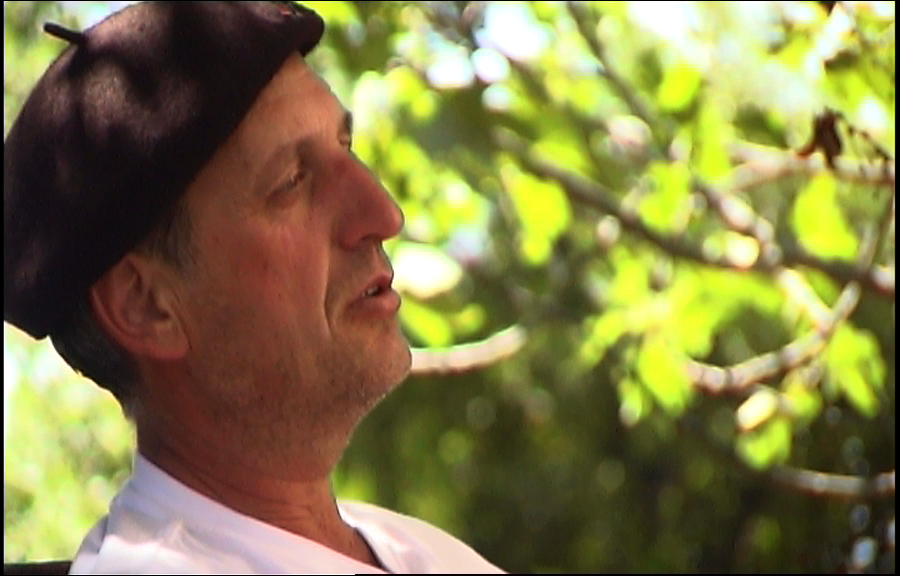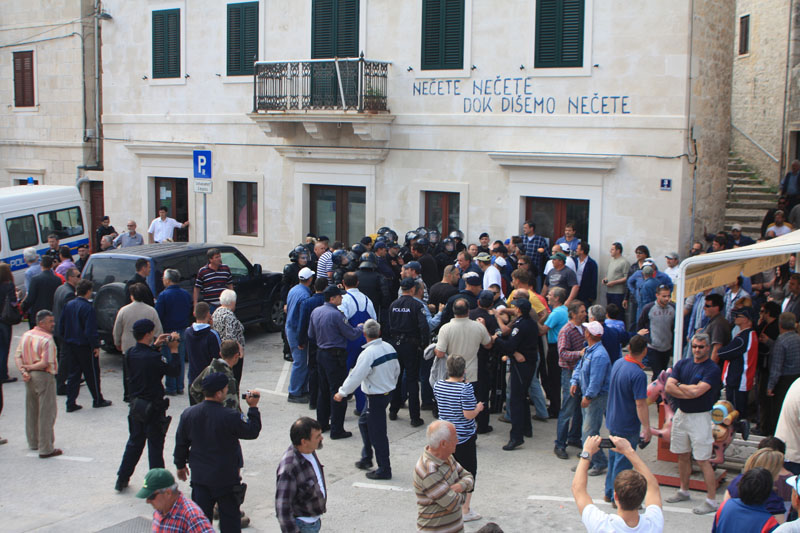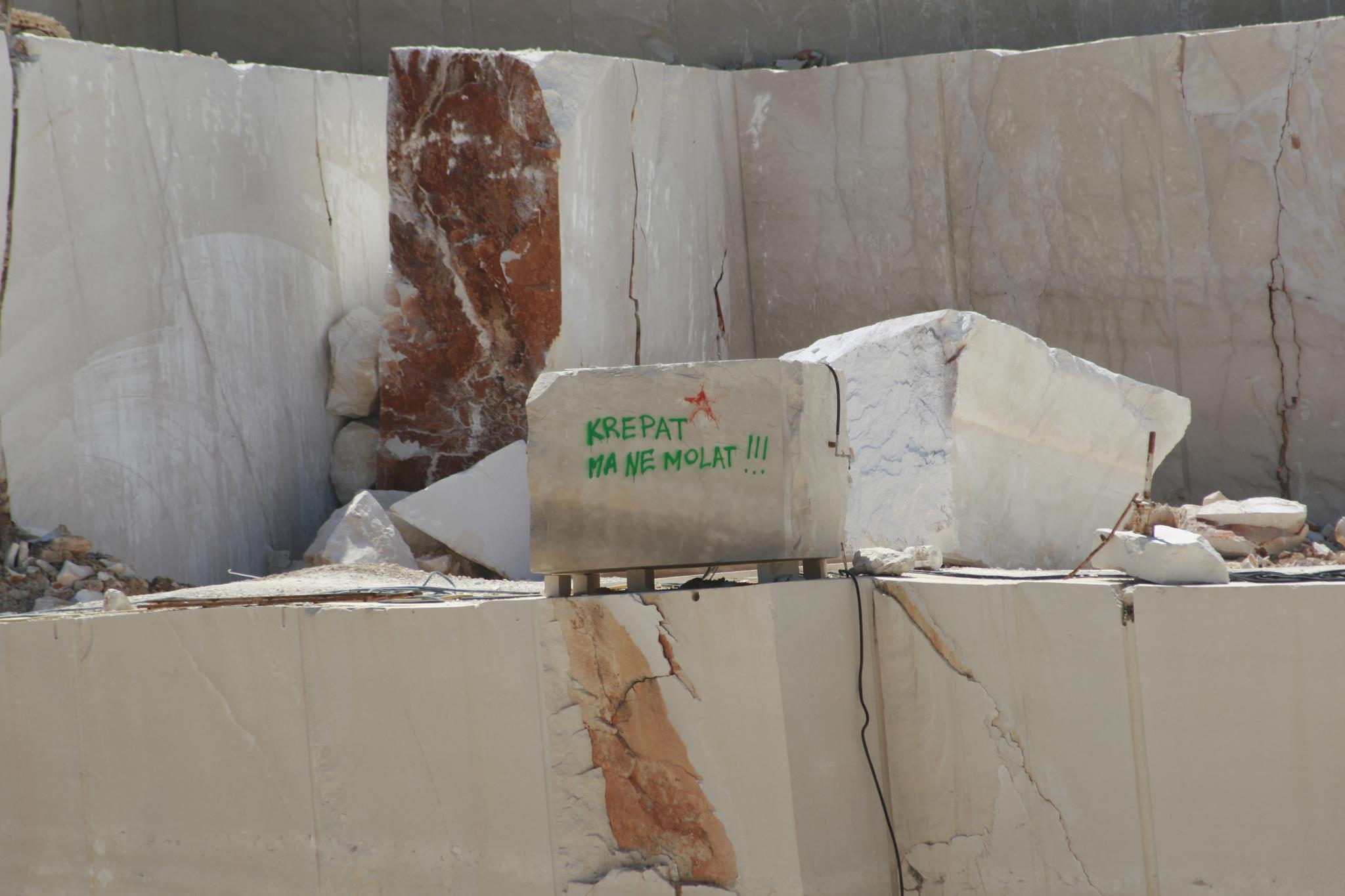Treba okupirati kamenolom, osnovati zadrugu i proizvoditi
Intervju sa Ivicom Šćepanovićem, radnikom Jadrankamena
We have to occupy the quarry, form a cooperative and produce
Interview with Ivica Šćepanović, a worker of Jadrankamen
15.08.2012.
Jadrankamen je firma koja se bavi obradom bračkog bijelog mramora. Nakon što su radnici blokirali stečajni postupak, u mjestu je intervenirala specijalna policija pa je tako ovaj slučaj odjeknu u cijeloj Hrvatskoj.
Jadrankamen is a firm for processing white marble taken out of quarries on the island of Brač. After the workers had blocked the default process, this case resonated throughout Croatia when SWAT police teams intervened on the island.
Protesti u Jadrankamenu su počeli u ožujku kad su kasnile plaće, narasli dugovi. Kako je došlo do toga?
Problemi su nastali malo pri, počelo je sa privatizacijom pa se to razvlačilo. Doprinosi nisu uplaćivani već tri godine, nismo mogli dobit jeftine kredite za pokrit dugove i ono što se vadilo pare iz Jadrankamena i stavljalo negdje drugdje. Kad su počeli problemi i sa neto plaćama, onda se krenulo u štrajk.
Kako ste krenuli u borbu?
Nepromišljeno. Kod nas ni problem organizirat štrajk. To je vrlo jednostavno, problem je kako završit štrajk. Prvi štrajk je bija lani u 3. misecu i taj štrajk nikad ni završen. Nikad ni riješen problem zbog kojeg je pokrenut bilo koji štrajk kod nas.
Trenutno je Jadrankamen u stečaju. Kolike su šanse da počne ponovno raditi?
Jadrankamen će sigurno nastaviti raditi, pitanje je samo sa koliko radnika. Vlada daje garanciju da će ona i Erste banka otplatiti dugove u zamjenu za vlasništvo nad Jadrankamenom. Virojatno bi onda banka imala 52%, a država 48% vlasništva. Bili su neki dogovori da banka postavi upravu.
Kako gledate na to?
Ni dobro. Po meni ni dobro niti da radnici postanu vlasnici. Kakvi su radnici ka dioničari pokazali su se 90-ih. Mi smo imali 51% vlasništva Jadrankamena. Kad je došao novi gazda sa kešom, pali smo na 15%. Zato san ja predlaga zadrugu da ne bude dioničko vlasništvo. Ja sam predlagao da se napravi anketa među radnicima i da se vidi da li da idemo u osnivanje nove firme, ali ne poduzeća, nego zadruge. Zadruga ima veću slobodu djelovanja i organiziranja. Nije se prihvatio niti prijedlog ankete, niti prijedlog pokretanja zadruge.
Zašto banka može, a vi ne možete?
Jer mi nimamo para da bi platili koncesiju državi. Možemo to izvest jedino ilegalno. Treba jednostavno, po mom mišljenju, okupirat kamenolom, osnovat zadrugu i proizvodit. I u međuvremenu se natezat sa državom oko koncesije, vlasništva nad strojevima i imovinom… Međutim, ta ideja je trenutačno neostvariva jer je sindikat odustao od bilo kakvog plana preuzimanja firme, a radnici su, nakon 6 miseci neprimanja plaće, štufi sami sebe. Velika većina ih danas želi da se stvar riješi na bilo koji način.
Protests in Jadrankamen started in March, when wages were late and debt was at its highest. How did it come to that?
Problems started before that, it all begun with the privatization. Our benefits were not paid for three years, we could not get affordable loans to cover our debt, and, apart from that, they were pulling money out of Jadrankamen. But, when they stopped paying us, we went on strike.
How did you go into the fight?
Recklessly. Here, you can always start a strike. But, the problem is how to end it. We first went on strike in March of this year and that strike has not ended. There has never been a solution to the problem that made us go on strike in the first place.
At the moment, Jadrankamen is in default. What are the chances for the quarry to open again?
We will continue working; the only question is with how many workers. The government guarantees that, together with Erste Bank, it will pay off the debts of Jadrankamen and in return claim ownership over it. That probably means that the bank would own 52%, while the state would own 48%. There was some talk of the Bank choosing the management.
What do you think about that?
It’s not good. In my opinion, it would be equally bad if the workers became owners. Workers proved to be bad shareholders back in the nineties. We owned 51% of the company back then. When the new boss came and offered cash, we ended up owning only 15%. That is why I suggested we should form a cooperative rather than a joint stock company. A cooperative has more freedom of working as well as organizing. But, that suggestion fell through because it was impossible to obtain the concession over the quarry by forming a cooperative.
The bank could do that, but not you?
Because we do not have the money to pay the state for the concession. We can only do it illegally. I think that we should simply occupy the quarry, form a cooperative and start producing. And, in the meantime, negotiate with the state about the concession, ownership over the machines and the real-estate. However, after six months of unpaid wages, the workers are sick and tired of it all and most of them just want this thing to be resolved in any way possible.
Radnici blokiraju pristup upravnoj zgradi, 3.05.2012. (foto: Ivica Šćepanović)
..
Workers blocking the access to the administration building, 3.05.2012 (photo: Ivica Šćepanović)
..
Kako pitanje vlasništva utječe na ideju o samoorganizaciji radnika?
Ako su po ustavu svi oblici vlasništva ravnopravni, onda smo mogli ostavit i društveno vlasništvo. Jer ni istina da je rudno bogatstvo vlasništvo države. To je vlasništvo ljudi. Mi kao radnici, kao stanovnici ovoga područja možemo puno pametnije i bolje koristiti to rudno bogatstvo za dobrobit svih, ne samo za dobrobit banke, gazde ili ministara. Jer mi možemo radit i, kad si isplatimo plaće, biti na nuli, i mi smo zadovoljni. Ali, ako mi gazdi radimo na nuli, on zatvara firmu jer on nema dobiti, nema interesa držat firmu.
Išli ste i do Splita, do Dalmacijavina, Uzora, Montera u podršku radnicima u sličnoj situaciji.
Nabrojali ste 3 firme od kojih su 2 vlasnički vezane sa Jadrankamenom. Uzor i Monter su bile firme priko kojih se izvlačio novac iz Jadrankamena. Mi smo pružili podršku radnicama Uzora kad su one stupile u štrajk i tijekom stečaja u vlastitoj režiji pokrenule proizvodnju šivanja robe. Jednostavno su dale oglas u novinama: „Donesite svoje materijale, mi ćemo vam sašit što poželite, platit ćete rad“. Sindikat Jadrankamena je poslao neku pomoć i one su to uložile u proizvodnju. Nažalost, Uzoru je završio stečaj i ljudi su pošli doma bez izgleda da se vrate natrag, Monter je danas u stečaju ko i Jadrankamen…
No unatoč stečaju vi i dalje proizvodite?
Radnici i dan-danas rade iako je dolaskom stečajnog upravitelja naređeno da se udalje, ali grupa radnika u štrajku je radila svo vrime. Kad je uprava zaprijetila da će pokrenuti stečaj, radnici nisu obustavili štrajk, nego su počeli radit. Samoinicijativno - nije se izdavala roba van, nego su počeli proizvoditi i puniti lager. Nafta je par puti kupljena sa novcima od sindikata, ništo brusi smo dobili od čovika iz Pučišća… Mi nismo mogli prodavat sa papirima, ali nismo dali njima da odvoze robu dok se ne postigne neki dogovor.
How does the issue of ownership influence the idea of workers’ self-organizing?
If all of forms of ownership are equal under the constitution, then we could have kept the common property. Because, it is not true that the mineral resources are owned by the state. The people own them. We, as workers, as residents of these places, we can use those resources fairly and wisely for everyone’s benefit, not just the benefit of the bank, the boss or the ministers. We can work only for a salary, without profit. But, if we work for a boss, we have to make profit, otherwise he has no interest to continue production.
You traveled to Split and supported the workers of Dalmacijavino, Uzor and Monter who are in a similar situation.
Two of those firms are connected with Jadrankamen through ownership. Uzor and Monter were firms through which money was pulled out of Jadrankamen. We supported the workers of Uzor when they went on strike during which they organized production by themselves. They just put an ad in the newspapers saying: “Bring your own material, we will sew whatever you need, you will just pay for the work”. Our union had sent money to them and they invested it in the production. Unfortunately, when the default process ended, people had to go back home without much chance of returning to their workplace. Monter is still undergoing default, as well as Jadrankamen.
But, despite the default, you still produce?
Workers are still working, even though the default manager ordered them to leave. When the management threatened with default, workers did not end the strike, but started working. We self organized the production, but did not sell the product, just stocked it. Oil was purchased a couple of times with the money from the union, we got some grinders from a man from Pučišća. We could not sell legally, but we did not allow them to take our product until we can reach an agreement.
Sukob policije i radnika 3.05.2012. (foto: Ivica Šćepanović)
..
Clash between police and workers 3.05.2012 (photo: Ivica Šćepanović)
..
Javnost u Hrvatskoj je vjerojatno najviše čula za slučaj Jadrankamena kada je 200-tinjak specijalaca izvršilo desant na Pučišća. Što se točno desilo?
Stečajni upravitelj je prije toga dolazio u Pučišća i poljubio je vrata, ni ga se pustilo u upravnu zgradu. I sud je naredi da ide preuzest poslovanje i posla je zahtjev policiji da mu to obezbijedi. Možda je to bila upitna politička odluka, ali broj policajaca koji je došao bio je normalan jer, da je on došao sa deset policajaca, vratija bi se neobavljena posla. Tako da su jednostavno razmakli radnike, 10-12 ih je privedeno, nakon dvi ure su hi vratili doma bez ikakvih papiri. Jenemu su samo podnijeli prekršajnu prijavu da je potegnuja pandura.
Ta upravna zgrada je ona u centru s razbijenim staklom na kojoj piše „fašisti“?
Je, to je kasnije napisano. A staklo je razbija zaštitar koji je doša sa stečajnim upraviteljem. Kako smo blokirali kalu do ulaza u firmu, ovi su pokušali proći kroz podrum. I kako je tuka nogom u vrata, falija je drveni okvir i udrija u caklo. Ali opet nisu mogli ući jer je unutra sve bilo solidno zabarikadirano. Tako da su morali čekat da im policija raščisti put.
Kad je došla policija, cijelo se mjesto diglo na noge?
Nažalost ni. Realno bi bilo ne da se za Jadrankamen digne cilo misto, nego da se digne cili Brač. Recimo, kada je raspisan referendum za opoziv načelnika zbog toga ča ni da podršku ovakvim akcijama sindikata, tribalo je izać priko 50% svih ljudi, a ti broj se ni niti blizu postiga.
Tko je pokrenuo inicijativu za referendum?
Grupa žena u udruzi Žene kamena koja se organizirala da bi pružila podršku radnicima Jadrankamena. Većina njih je u rodbinskim vezama sa radnicima. Pokrenule su nike akcije za skupljanje novca za školovanje dice radnika, 2,3 koncerta su organizirana.
The public became aware of your case mostly since 200 policemen invaded Pučišća. What happened exactly?
The default manager came to Pučišća one time before that and had to turn around and leave, we didn’t let him enter the administrative building. The court ordered that he should take over the firm and asked the police to help that happen. Maybe that was a questionable political move, but this number of policemen was logical, because if he had come with only ten of them, he would have to go back empty handed again. They arrested a dozen workers and returned them after two hours without any charges. Only one worker was charged because he hit one of the policemen.
The administrative building is the one in the center of the town with a broken window and graffiti that says “fascists”?
Yes, that was written later on. And the window glass was kicked in by one of the security guards who came to protect the default manager. As we were blocking the side alley and the entrance to the building, they tried to go in through the basement. And as he tried to kick the door in, he missed and broke the glass. But, still, they could not get in because everything inside was barricaded. So, they had to wait for the police to clear the way.
When the police came, the whole town stood with the workers?
Unfortunately, no. Everybody SHOULD stand in defense of Jadrankamen, not just the town, but the whole island of Brač. For example, when we had a referendum on revoking the mayor because he did not support the methods of the union, we needed 50% of the residents to vote, but the number of people who came to the polls was nowhere near that number.
Who initiated the referendum?
A group of women from the association “Women of stone”, who initially got together to support the workers of Jadrankamen. Most of them are related to the workers. They also initiated some actions to raise money for scholarships for workers’ children. They also organized two or three concerts.
Kakav je stav načelnika po pitanju Jadrankamena?
Načelnik je javno istupi protiv djelovanja sindikata, protiv blokade firme. On je, barem verbalno, pružija podršku obrani radnih misti, ali je isto tako javno izjavi da ćemo vjerojatno u stečaj ukoliko nastavimo sa štrajkom.
Kao što su rektor i dekani rekli studentima za vrijeme blokade da podržavaju cilj, ali ne i metode?
Ništo slično.
Sukob se proširio iz same fabrike na cilo misto. Kako gledate na današnji sustav upravljanja Pučišćima?
Ovako se dobit razdili između gazde i političara. Ali da je društveno vlasništvo, da ljudi lokalno upravljaju, jednostavno mi dobijemo! Neš ti problema u jenem Humcu, koji ima dvista pedeset ljudi, da se skupidu pedeset da rečedu ča triba učinit, da se dogovorimo i da to učinimo. I onda kad bi se mi dogovorili, ne bi moga niki pogodit posal, ne bi si nidan moga stavit u žep. Je triba popločat piacu u mistu? Napravit ćemo. Mujte! Niko-niko. Jer je to za nas! A gazdi to ni u interesu. Zašto bi on namin poploča piacu misto da proda taj materijal i stavi si šolde u banku? Briga njega za našu piacu!
Where does the mayor stand when it comes to Jadrankamen?
The mayor publicly opposed the methods of the union; he is against the blocking of the firm. He stated publicly that he supports our efforts to defend our workplace, but also publicly claimed that our firm will go into default if we continue with the strike.
The same as the deans of universities, when they said to the students during the occupation, that they support their goal, but not the methods?
Something like that.
The conflict spread from the factory to the whole town. What do you think of the way Pučišća is governed today?
Now, the boss and the politician share all of the profit. But if we had common property, if the people were running things, we would be the ones benefitting from our work! In a village such as Humac, where only 250 people live, it would be a piece of cake for 50 of them to get together and say what is to be done, to come to an agreement and do it. And then, if we are doing it ourselves, nobody can cheat us, nobody can steal our money. We need to pave our square? We will do it! For free! Because it’s for us! But that is not in the bosses’ interest. Why would he pave our square with the material he can just as easily sell and take the money? He doesn’t give a damn for our square!



